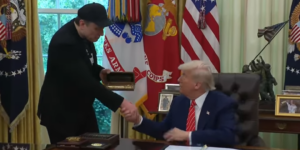The Latest: Here’s What We Know About Hillary Clinton’s ‘Medical Episode’
After weeks of downplaying concerns about her health as “conspiracy theories,” Democratic presidential nominee Hillary Clinton had a pneumonia-induced “medical episode” while taking part in the 9/11 memorial service in New York City on Sunday.
The story has continued to develop and evolve over the past 24 hours, so here’s what we know right now.
The Collapse
Clinton was taking part in the 9/11 memorial service at Ground Zero when she suddenly began to feel ill and cut her visit short. She walked under her own power a few feet to the location where her motorcade would pick her up, but had to wait.
Once the van arrived to take her away, she had to be carried by Secret Service agents and staffers into the vehicle. Her press pool was not notified of the incident for more than an hour, at which time they were informed she had “overheated.”
Several mainstream media outlets took up that explanation, stating the city was in the midst of a “heat wave.” According to both the National Weather Service and AccuWeather.com, that weather had already broken before the memorial service began, and temperatures were no more than in the low 70s.
It’s Pneumonia
Several hours later, Clinton’s doctor stated that she had been diagnosed with pneumonia on Friday, saying it was brought on by coughing fits related to her “allergies.” But that explanation doesn’t fit with the medical science.
According to the Mayo Clinic:
Many germs can cause pneumonia. The most common are bacteria and viruses in the air we breathe. Your body usually prevents these germs from infecting your lungs. But sometimes these germs can overpower your immune system, even if your health is generally good.
The Clinton campaign did not provide any explanation for why her condition had been hidden for nearly three days.
Additionally, pneumonia is contagious for up to 10 days, once symptoms arrive, sparking questions about why she would put herself in a situation where she could potentially infect hundreds of other people. When she emerged from her daughter Chelsea’s apartment—where two young children live, potentially exposing them to her contagious condition—Clinton waved to the press and told them she was “feeling great.” A few moments later, a young girl broke through her protection detail and the Democratic presidential nominee gave her a hug—potentially exposing that child, as well.
Democrats Fed Up?
Emmy Award-winning broadcast journalist David Shuster, who has worked for FOX News Channel, CNN, MSNBC, CurrentTV and Al Jazeera America, reported late Sunday night that he had spoken with Democratic Party operatives who said they were now planning an emergency meeting to consider a replacement candidate. He shared the information with his followers on Twitter:
Clarification from dem operatives @HillaryClinton pneumonia: Expect emergency DNC meeting to CONSIDER replacement. #HillarysHealth
Dem operative: @HillaryClinton #BasketOfDeplorables, hiding pneumonia for 3 days, + fainting video = “unchartered political territory.”
Top dem: “we can make contingencies, argue, plead with @HillaryClinton, but DNC bylaws are clear her nominee status now totally up to her.”
As it stands, @HillaryClinton + @realDonaldTrump have only released “summaries,” not the full [medical] records themselves.
Replacing a presidential nominee after the party’s convention was, for a short time, one of the mainstream media’s favorite unsubstantiated rumor regarding Republican presidential nominee Donald Trump. It’s never actually happened before, although both parties’ bylaws do have contingencies for doing so.
The closest the nation has ever come to that situation was in 1872, when Democrat Horace Greeley died in between Election Day and Inauguration Day. He lost to Republican Ulysses S. Grant in a landslide, so it didn’t impact the presidency—but it could have.
In 1912, Vice President James Sherman died less than a week before the general election. His name appeared on the popular ballot, but the Republican Party gathered to appoint a successor, Columbia University President Nicholas Butler. President William Taft lost the election, however, to Woodrow Wilson, but had the election gone differently, electors would have seen Butler’s name—not Sherman’s—on the Electoral College ballot.
Cancelling Appearances
Further fueling concerns about her health, Clinton’s campaign announced Sunday evening that it was suspending a number of campaign events for this week. She was supposed to spend two days campaigning through California on Monday and Tuesday, but will instead spend the time recuperating at her home in Chappaqua, N.Y.







































